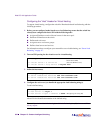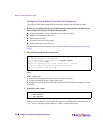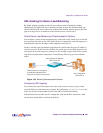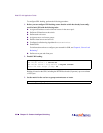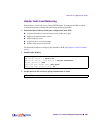
Web OS 10.0 Application Guide
382
Chapter 15: Content Intelligent Switching
212777-A, February 2002
Configuring the “Host” Header for Virtual Hosting
To support virtual hosting, configure the switch for Host header-based load balancing with the
following procedure:
1. Before you can configure header-based server load balancing, ensure that the switch has
already been configured for basic SLB with the following tasks:
n Assign an IP address to each of the real servers in the server pool.
n Define an IP interface on the switch.
n Define each real server.
n Assign servers to real server groups.
n Define virtual servers and services.
For information on how to configure your network for server load balancing, see “Server Load
Balancing” on page 117.
2. Turn on URL parsing for the virtual server for virtual hosting.
3. Define the host names.
4. Configure the real server(s) to handle the appropriate load balancing string(s).
To add a defined string:
where ID is the identification number of the defined string.
NOTE – If you don't add a defined string (or add the defined string “any”), the server will han-
dle any request.
>> # /cfg/slb/virt 1 (Select the virtual IP for host
header-based SLB)
>> Virtual Server 1 # service 80 (Select the HTTP service)
>> Virtual Server 1 http Service # httpslb host
>> # /cfg/slb/layer7/slb/add "www.customer1.com"
>> Server Loadbalance Resource# add "www.customer2.com"
>> Server Loadbalance Resource# add "www.customer3.com"
>> # /cfg/slb/real 2
(Select the real server)
>> Real Server 2 # Layer 7
>> Real Server 2 Layer 7 Commands # addlb <ID>(Specify the string ID)











